 |
THE MIKE STUART SPAN / LEVIATHAN STORY |
 |
THE MIKE STUART SPAN / LEVIATHAN STORY |
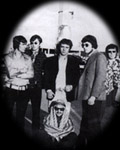 It's probably stating the obvious to observe
that there aren't many groups whose critical reputation is based
almost exclusively on the merits of a handful of unreleased
recordings. Nevertheless, the esteem in which the Mike Stuart
Span are currently held by collectors of vintage British
psychedelia is palpably out of proportion to the overall quality
of the band's vinyl output during their chequered exsistence: of
the four singles issued in the Span's name, two are ignored
whilst a third is actively avoided. In the last few years,
however, a selection of superior studio outtakes and radio
broadcasts has slowly surfaced courtesy of the nefarious
activites of certain individuals intent on replacing the
counter-culture of the 1960s with an under-the-counter culture
for the 1990s. This exploitation of the group culminated in the
release in Germany of an unauthorised compilation album (actually
credited to post-Span band Leviathan) that compounded a blatant
abuse of trust with execrable sound quality and shabby packaging.
However, this unsavoury episode merely galvanised the band (and
drummer Gary Murphy in particular) to find a more appropriate
epitaph for their past musical endeavous. After an interim EP
project with a short lived psychedelic fanzine, the 'Timespan'
album was pieced together from the band's own extensive archives
and released in vinyl-only format by Tenth Planet in February
1995. Following the rapturous reception that this issue received,
a CD equivalent boasting five extra tracks (including the band's
highly regarded session for John Peel's Top Gear show) has now
been assembled. The fact that such a venture is considered to be
both financially and aesthetically viable surely provides a
graphic illustration of the Span's standing amongst collectors
more than a quarter of a century after the four musicians went
their separate ways.
It's probably stating the obvious to observe
that there aren't many groups whose critical reputation is based
almost exclusively on the merits of a handful of unreleased
recordings. Nevertheless, the esteem in which the Mike Stuart
Span are currently held by collectors of vintage British
psychedelia is palpably out of proportion to the overall quality
of the band's vinyl output during their chequered exsistence: of
the four singles issued in the Span's name, two are ignored
whilst a third is actively avoided. In the last few years,
however, a selection of superior studio outtakes and radio
broadcasts has slowly surfaced courtesy of the nefarious
activites of certain individuals intent on replacing the
counter-culture of the 1960s with an under-the-counter culture
for the 1990s. This exploitation of the group culminated in the
release in Germany of an unauthorised compilation album (actually
credited to post-Span band Leviathan) that compounded a blatant
abuse of trust with execrable sound quality and shabby packaging.
However, this unsavoury episode merely galvanised the band (and
drummer Gary Murphy in particular) to find a more appropriate
epitaph for their past musical endeavous. After an interim EP
project with a short lived psychedelic fanzine, the 'Timespan'
album was pieced together from the band's own extensive archives
and released in vinyl-only format by Tenth Planet in February
1995. Following the rapturous reception that this issue received,
a CD equivalent boasting five extra tracks (including the band's
highly regarded session for John Peel's Top Gear show) has now
been assembled. The fact that such a venture is considered to be
both financially and aesthetically viable surely provides a
graphic illustration of the Span's standing amongst collectors
more than a quarter of a century after the four musicians went
their separate ways.
The Mike Stuart Span evolved out of a Brighton-based youth club
group called the Mighty Atoms, who included vocalist Stuart
Hobday and bassist Roger McCabe in their ranks. By 1965 Hobday's
early attempts at songwriting had secured a publishing contract,
and the Mike Stuart Span (a name credited by reversing the
singer's Christian names) were formed as an outlet for the
budding composer's material. In addition to Hobday and McCabe,
the embryonic Span included Nigel Langham (guitar), Ashley Potter
(organ) and a teenage drummer by the name of Gary 'Roscoe'
Murphy. A liaison with local promoter / manager Mike Clayton
resulted in the replacement of Potter with Jon Poulter and the
addition of a horns section (Gary Parsley on trumpet and Dave
Plumb on saxophone) as the band concentrated their efforts on
American-derived soul music. Extensive rehearsals ensued, with
the local press memorably dubbing them 'the band behind closed
doors', before the Span emerged to claim their share of the local
spotlight at the dingy Chatsfield Hotel in Brighton. However, any
sense of euphoria was quickly and cruelly shattered: tripping on
LSD, guitarist Langham fell to his death after leaping through an
upstairs window. The band were left in a profound state of shock
and the Mike Stuart Span subsequently became a resolutely
drug-free zonedespite the blandishments of the encroaching
psychedelic era.
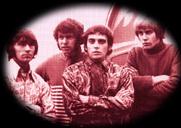 Langham's death left the Span without a
guitarist, and for a while they elected not to replace him.
Despite this self-imposed handicap, the band secured a recording
contract with EMI after cutting an acetate of Stuart Hobday's
'Work-Out' coupled with a version of the Drifters 'Follow Me'
However, it was another Drifters number 'Come On Over To Our
Place' that was selected as the A-side for the band's debut
single on the Columbia label in November 1966, backed by another
Hobday original entitled 'Still Nights'. A second single followed
in June 1967, but the Span's rendition of the Cat Stevens song
'Dear' (supported by Mike D'Abo's 'Invitation') was equally
unsuccesful, and EMI decided to drop the band. Perversely enough,
this is where the Mike Stuart Span story really
starts.....
Langham's death left the Span without a
guitarist, and for a while they elected not to replace him.
Despite this self-imposed handicap, the band secured a recording
contract with EMI after cutting an acetate of Stuart Hobday's
'Work-Out' coupled with a version of the Drifters 'Follow Me'
However, it was another Drifters number 'Come On Over To Our
Place' that was selected as the A-side for the band's debut
single on the Columbia label in November 1966, backed by another
Hobday original entitled 'Still Nights'. A second single followed
in June 1967, but the Span's rendition of the Cat Stevens song
'Dear' (supported by Mike D'Abo's 'Invitation') was equally
unsuccesful, and EMI decided to drop the band. Perversely enough,
this is where the Mike Stuart Span story really
starts.....
EMI's decision forced the Span to take artistic stock, and their
immediate response was to dismiss the increasingly anachronistic
horns section, with keyboardist Poulter also departing shortly
afterwards. An advertisement in Melody Maker
recruited guitarist Brian Bennett, who had previously been a
member of Tony's Defenders alongside drummer Roger Siggery, by
this stage wielding the sticks for Jason Crest - an outfit whose
career would subsequently progess with uncanny similarites to the
Span's. The new guitarist fierce but fluid style accelerated the
transition from soul to rock, with Sam & Dave material giving
way to Cream and Hendrix covers that were bolstered by a quantum
leap in the quality of the band's self-penned material, which
both lyrically and instrumentally reflected the new cultural
backdrop provided by the burgeoning Summer of Love.
With a line-up of Stuart Hobday (vocals), Brian Bennett (guitar),
Roger McCabe (bass) and Gary Murphy (drums), the revised and
revitalised Mike Stuart Span played their first gig on the final
day of September 1967 to a rapturous reception. The new
combination rapidly became a popular live attraction, and were no
doubt aided by manager Clayton's links with a London booking
agency. However, the previous incarnation of the Span had also
boasted a hectic live schedule, and healthy attendances hadn't
translated into sales figures for the accompanying vinyl product.
With this in mind, the band paid more attention than before to
the importance of studio work, starting with an October 1967
session at Decca with Dave Paramor, who had produced their EMI
singles (Paramor had also worked extensively with Simon Dupree
& the Big Sound, who had been one of the Span's main rivals
on the South Coast soul scene). Three tracks were laid down: a
suitably revamped version of Fontella Bass hit 'Rescue Me', the
magnificent Murphy / Bennett original 'Second Production' and,
perhaps most intriguingly of all, a mysterious instrumental that
was christened 'As Close As We Can Get It' due to Paramor's
insistence that the track should last exactly two and a half
minutes! Inexplicably Decca decided that the recordings were
insufficiently commercial and declined to persue their interest
in the band.
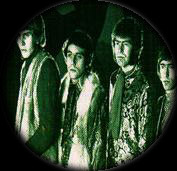 Without record company support, the Span and
Mike Clayton boldly took matters into their own hands, funding a
privately issued single that appeared on 16 February 1968 on the
band's Jewel label. 'Children of Tomorrow' and 'Concerto of
Thoughts' - two tracks that effortlessly confirmed the Span's
credentials as tunesmiths and musicians - were recorded at R.G.
Jones studio in Morden, home of the now fiercly collected Oak
custom label. The single was apparently pressed in a quantity of
500 copies, thereby condeming 'Children of Tomorrow' - now widely
acknowedged by psychedelic collectors as a masterpiece of the
genre - to an extremely limited potential audience.
Without record company support, the Span and
Mike Clayton boldly took matters into their own hands, funding a
privately issued single that appeared on 16 February 1968 on the
band's Jewel label. 'Children of Tomorrow' and 'Concerto of
Thoughts' - two tracks that effortlessly confirmed the Span's
credentials as tunesmiths and musicians - were recorded at R.G.
Jones studio in Morden, home of the now fiercly collected Oak
custom label. The single was apparently pressed in a quantity of
500 copies, thereby condeming 'Children of Tomorrow' - now widely
acknowedged by psychedelic collectors as a masterpiece of the
genre - to an extremely limited potential audience.
Although the single failed to attract the attentions of an
established record label, the Span were beginning to widen their
horizons, attracting some valuable publicity both at home and
aboard. A cameo appearance in the film, Better
A Widow, successful tours of Germany and
Belgium, jamming with Jimi Hendrix at the Speakeasy (Brian
Bennett was so nervous at the prospect of performing with his
idol that he dropped his plectrum!) and the performance of a 20
minute science fiction fantasy entitled 'Cycle' for the Brighton
Arts Festival - sadly not perserved for posterity - were all
indicative of the favourable reception that the band were
enjoying in their attempts to make that vital commercial
breakthrough. Following an excellent session for the John Peel's Top
Gear programme in May 1968, such a
breakthrough seemed closer than ever when the Span were chosen as
the featured group in a BBC television documentry called A Year
In The Life (Big Deal Group), an expose of the music business as
experienced by a young and unknown pop group. A
Year In The Life would assiduously chart
the band's progress over the twelve months, and as such would
eloquently capture their corruption from optimistic, freshfaced
innocents into bitter, jaded cynics.
The first step in this process was inadvertently achieved by Mike
Clayton's ill-judged attempts to 'set-up' a hit single in
conjunction with the Fontana label and those past masters of the
bland, formularised pop pap, Ken Howard and Alan Blaikley. 'You
Can Understand Me', backed by equally risible 'Baubles and
Bangles', was issued in August 1968 and duly received
thepre-arranged patronage of Radio Luxembourg, but despite the
behind-the-scenes machinations the single plunged into the
instant obscurity that it undoubtedly warranted. The Span
bitterly resented the way that 'You Can Understand Me' had been
foisted upon them, and following Clayton's equally disastrous
attempts to establish the band's own record shop Exspansions
in Brighton, they parted company with their manager in
acrimonious - not to mention penniless-circumstances. With
Fontana off the scene and Clayton also about to disappear, the
Span were able to eschew artistic compromise in favout of
intrinsic musical merit. A series of high quality demonstration
recordings were made at R.G.Jones, including new material of the
calibre of 'Through The Looking Glass', 'World In My Head' and
'Blue Day', which had been inspired by the rapidly-devolping UK
blues boom. Clayton's final managerial act before disappearing
into the wide blue yonder was to present these demos to Clive
Selwood, head of the UK branch of Elektra. Selwood was
sufficiently impressed to notify label president Jac Holzman of
the band's potential, and the Span were duly signed to Elektra in
early 1969. Holzman immediately commissioned an album, but
insisted on a change of name for his new charges. Thus it was
that the Mike Stuart Span were rechristen Leviathan.
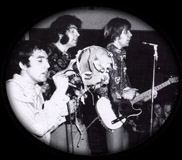 Elektra officially launched Leviathan's
recording career in April 1969 with the simultaneous issue of two
singles. Three of the chosen tracks - 'Remember The Times',
'Second Production' and 'Time' - had been initally been conceived
as Span recordings, with the newly-composed 'The War Machine'
completing the quartet. Elektra's media assault was strengthened
by the support of the influential John Peel and a live
performance of 'Remember The Times' on the television show Late
Night Live Line-Up, but with the benefit of
hindsight, the label would probably have been better advised to
concentrate on promoting one track rather than 'The Four Faces of
Leviathan' as the campaign had been rather portenously titled.
Elektra officially launched Leviathan's
recording career in April 1969 with the simultaneous issue of two
singles. Three of the chosen tracks - 'Remember The Times',
'Second Production' and 'Time' - had been initally been conceived
as Span recordings, with the newly-composed 'The War Machine'
completing the quartet. Elektra's media assault was strengthened
by the support of the influential John Peel and a live
performance of 'Remember The Times' on the television show Late
Night Live Line-Up, but with the benefit of
hindsight, the label would probably have been better advised to
concentrate on promoting one track rather than 'The Four Faces of
Leviathan' as the campaign had been rather portenously titled.
Despite the commercial failure of both singles, work continued on
the band's album at Trident Studios. As a taster for the LP, a
further single coupling 'Flames' and 'Just Forget Tomorrow' (a
cryptic title?) was recorded in the summer. By the time that it
surfaced in October 1969, however, Leviathan were no more
(although as Gary Murphy wryly notes, had the single been a
spectacular success the band would have no doubt have hastily
reformed!). The final straw had come when Jac Holzman pronounced
himself dissatisfied with the completed album, suggesting that
the band should follow Traffic's example by retiring to a cottage
for several months in order to immerse in the process of creating
original music. Elektra were prepared to support the band
financially during this period, but Brian Bennett, who had
continued to work during the band's attempts to make the big
time, felt that he could make more money labouring on building
sites (as opposed to labouring in pop groups, presumably).
Without the support of all four band members the project
floundered, and by the time that the documentry A
Year In The Life was broadcast in late
September 1969, the group had gone their separate ways. Roger
McCabe would withdraw from the music business completely, while
Stuart Hobday embarked on what was to prove a highly succesful
career with the BBC as a music producer. Brian Bennett joined the
final incarnation of Jason Crest (who would shortly mutate into
High Broom), where he was reunited with Roger Siggery, his fomer
colleague in Tony's Defenders. Despite his bitterness at the
failure of the Span / Leviathan, Gary Murphy was persuaded to
join a local blusey progressive outfit called Hellmet, who
recorded sufficient material for an album. As with the Leviathan
LP, this project also failed to gain a release.
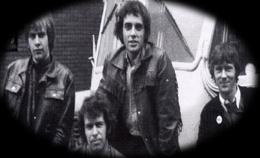 The Mike Stuart Span / Leviathan story may
well have ended at the juncture, but by the mid-1980s the band
had become a cult name amongst collectors of obscure British
psychedelic 45s, and this blated reappraisal was intensified by
the BBC's decision to broadcast an updated A
Year In The Life in December 1989
(subsequently repeated in early 1991). With the Oak custom label
(on which many of the Span's acetates had been cut) fast becoming
a parallel phenomenon of the record collecting world, the band
found themselves attracting attention on two separate levels.
Although this has so far proved insufficient to induce Elektra to
exhume the lost Leviathan album, the band's own achives have
proven extensive enough to enable 'Timespan' to stand as an
impressive testament to their undoubted excellence. No less than
nine tracks including 'Children of Tomorrow' and 'Concerto of
Thoughts' have been extracted from Oak acetates. 'Evil Woman'
(also recorded to far lesser effect, by Spooky Tooth) and
'Through The Looking Glass' are studio outtakes recorded by
Leviathan in 1969, while the compilation is completed by the four
tracks recorded for Top Gear
in May 1968.
The Mike Stuart Span / Leviathan story may
well have ended at the juncture, but by the mid-1980s the band
had become a cult name amongst collectors of obscure British
psychedelic 45s, and this blated reappraisal was intensified by
the BBC's decision to broadcast an updated A
Year In The Life in December 1989
(subsequently repeated in early 1991). With the Oak custom label
(on which many of the Span's acetates had been cut) fast becoming
a parallel phenomenon of the record collecting world, the band
found themselves attracting attention on two separate levels.
Although this has so far proved insufficient to induce Elektra to
exhume the lost Leviathan album, the band's own achives have
proven extensive enough to enable 'Timespan' to stand as an
impressive testament to their undoubted excellence. No less than
nine tracks including 'Children of Tomorrow' and 'Concerto of
Thoughts' have been extracted from Oak acetates. 'Evil Woman'
(also recorded to far lesser effect, by Spooky Tooth) and
'Through The Looking Glass' are studio outtakes recorded by
Leviathan in 1969, while the compilation is completed by the four
tracks recorded for Top Gear
in May 1968.
The obvious conundrum presented by the indisputable excellence of
'Timespan' concerns the band's apparently inexplicable lack of
success during their exsistance. Perhaps a clue lies in the fact
that one of their strongest compostions, the quintessential
psychedelic nugget 'Second Production', didn't appear until April
1969, a full eighteen months after the track had first been
recorded. A release in late 1967 at the height of the psychedelic
era may have resulted in an entirely different conclusion to the
Mike Stuart Span story, but by mid-1969 the music scene was
irreparably polarised between the underground progessive movement
and the increasingly successful bubblegum sound. The fate of
'Children of Tomorrow', possibly the Span's most fully realised
creation but frustratingly buried away on an obscure and very
limited private label issue, would appear to confirm that the
band were advised weak or inadequate management at a point in
their development when they were most in need of a guiding hand:
instead they were forced to record a single for Fontana that was
not only at odds with their normal style but a palpably bad
record even by standards of the mainsteam pop genre. However, it
should be pointed out the sub history of the late 1960s British
rock music is littered with psychedelic-based acts who, at the
time, failed to receive the acclaim and attention that they are
now being afforded. Perhaps the simple truth is that, despite its
current high profile, the British approximation of psychedelia
was essentially a cult attraction even during the era in
question: arguably only the Pink Floyd (and to a lesser extent,
Procol Harum and Family) can be said to have substained a career
on the initial impetus gained during the psychedelic era.
Ultimately, of course, speculation regarding the Span's lack of
success is pointless. Sadly 'Timespan' is incapable of rewriting
history or righting all the wrongs that befell the band during
their ill-fated existance, but at least its appearance - initally
on vinyl, now on compact disc - ensures that their recordings are
now legitimately available for the sizeable audience that has
belatedly come to value the band. At this stage of the game,
that's probably as much as anyone can ask.
Copyright : David Wells, March 1996. A BIG thank-you for David for the use of the 'Timespan' sleeve notes.